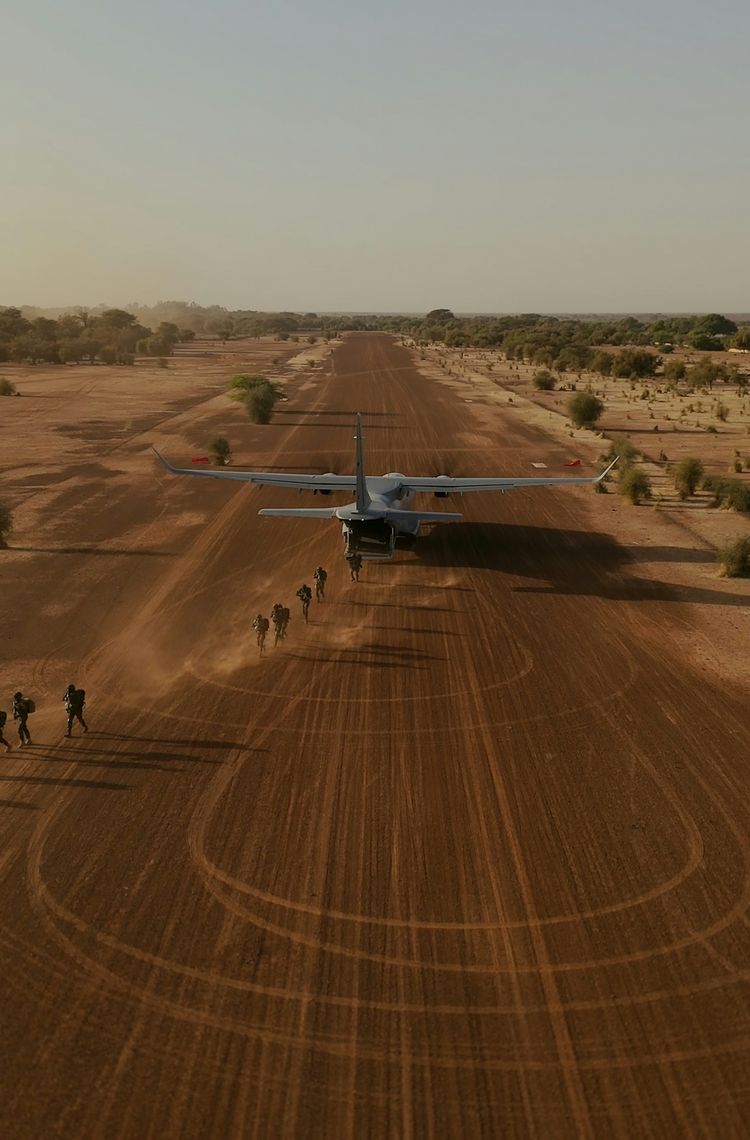“When I was a kid I loved aircraft. I was dreaming of being an astronaut or a pilot” says Captain Balla Moussa Coly, Chief of Training Operational Division of the Senegalese Air Force. Captain Coly is part of the first pilots promotion of the Senegalese Air Force School, graduating in 2021. He shows great pride in having been entirely trained for his dream job in his own country.
The activity at the senegalese Dakar-Ouakam Air Base - where Captain Coly is based, starts very early in the morning and each day there is a different challenge ahead. In order to face these daily operations in the best manner, the Senegalese Air Force has in recent years begun the modernization of its fleet. “In this context, we seek to have a high-performance aircraft, a tactical aircraft with good cargo capacity, and the C295 is a very suitable aircraft for this due to its multi-role functions”, said General El Hadj Niang, Chief of Staff of the Senegalese Air Force. The multi-role and multi-mission functions are in the C295’s DNA, having a fast and easy reconfigurable cabin able to transport from people to cargo, for very different missions.
Since the arrival of its two C295s in 2022, the Senegal Air Force has increased its capacity to carry out the full range of assigned missions: from logistical support (food, medicines, small vehicles…) in support of the population, to paratrooper release missions, medical evacuation or development support missions, that includes personnel and VIPs transportation.
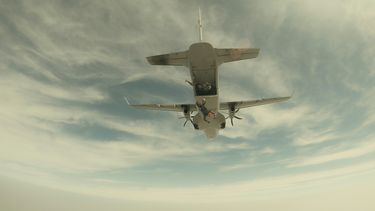
A safe bet
On a larger scale, over the last two decades, the African continent has increasingly shown the need for robust military transport aircraft to be able to perform all kinds of operations in a sometimes challenging environment.
With different climates along the region’s territory, the special weather conditions, such as the sand and dust suspended in the air in the Sahel or the corrosive salty breeze of the Gulf of Guinea, demands a very resilient means of transport on a daily basis, to be able to operate safely while maintaining a good level of fleet availability.
On top of this, due to the orography and infrastructures, the access to certain remote locations can only be achieved with an aircraft like the C295 that is able to operate in short and unpaved runways. “The C295 allows us to fly in any conditions and with complete security. The aircraft’s performance allows us to take off and land at 700 meters on any terrain in Senegal”, said Captain Coly.
A great example in the region was the support provided by a C295 operated by Kenya-based DAC Aviation International, to Mozambique in March 2019 following one of the worst-ever tropical storms to hit Africa: Cyclone Idai. The C295 delivered goods to the local population for 29 days after all roads were destroyed.
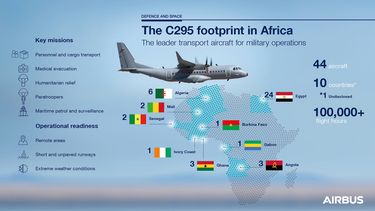
When one size fits all
Up to today, 44 C295s have been ordered by 10 different African air forces, which makes this medium tactical transport aircraft the leader of its segment in the region. Egypt, with 24 aircraft, is the fleet leader not only in the region but worldwide. However, the story of the C295 in the region began in 2004 with Algeria as the first African country to acquire this aircraft, having today 6 C295s in transport configuration. Twenty years after, the C295 is still generating interest and has shown that it is suitable not only for big fleets but also for small ones. A good example is Gabon, the most recent customer in the region, with one aircraft already received.
Africa is the only region in the world that has acquired C295s every year since 2018 - when one aircraft was ordered by Ivory Coast followed by Burkina Faso one year later. Even in 2020 during COVID-19 times, when the entire market was challenged, Mali acknowledged the great performance of the C295 and decided to acquire an additional aircraft. Senegal, Angola and Gabon came next, between 2021 and 2023.
In total, the African C295 operators have reached more than 100,000 flight hours since they began operations in 2005.
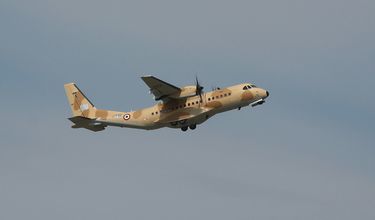
Ready anytime, anywhere
Another good example of resiliency and outstanding performance of the C295 in African territory was the international peacekeeping mission that the Senegal Air Force performed in Mali in September 2023, with 28 troops rotations in 14 days, performing a total of 200 flight hours - 16 hours per day.
In order to be ready for this kind of missions, the Air Forces need to train their troops. Podor, on the border between Senegal and Mauritania, is one of the selected locations for this purpose. “It is located in a fairly wild environment and high altitude -between 1,000 and 1,500 meters high, so landing there requires compliance with certain operational requirements. The idea is to achieve a tactical advance over the terrain. To do what we call assaulting landing, stay on the ground for a very short time because we are simulating the arrival in hostile terrain with the possible presence of hidden forces that could attempt to fire at the aircraft”, said Captain Cheikh Saad Bou Gueye, Chief of Operations of the Senegalese Air Force. “Therefore, we will have on the ground elements of the special air forces who will secure the area and, once the assault is completed, will quickly embark one or two wounded and then take off to leave the hostile area to depart to our base”.
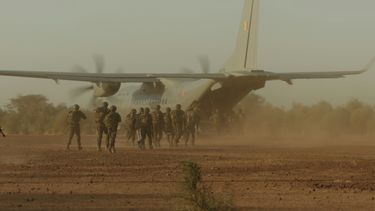
Much more than transport
On top of the light and medium transport market, where the C295 has owned the 80% share over the past 10 years, there is a growing interest in the Maritime and Land Surveillance market in the region.
Angola will soon be the first country in Africa to operate the C295 in Maritime Surveillance Aircraft (MSA) configuration. The Southern African country has acquired two MSA which will be key for maritime and ground surveillance, search and rescue or illegal fishing control missions, among others. These aircraft will be equipped with two FITS consoles, the Airbus’ Fully Integrated Tactical System for maritime surveillance. However, even with this hardware installed, it will still be compatible with cargo or personnel transport as well as for medical evacuation in a potential context of disaster relief or from a conflict zone.
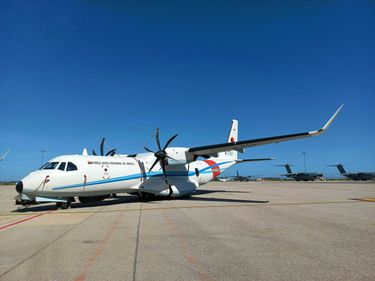
All means at hand to optimise fleet availability
“It is a modern aircraft with a modern technology behind that you have to be able to maintain,” said Commander Balla Sarr, Chief of Technical Logistics Support Command of the Senegalese Air Force. “The command provided us with an MITS system, which is maintenance through simulation. Having this technology allows us to maintain the aircraft in the long term and perform maintenance more easily.”
Airbus provides different kinds of support to the C295 operators such as material support -including reparation and supply of spare parts, but also technical support with a Field Service Representative, a Navigation Database and Technical Publications updates.
Separately, the heavy maintenance, which takes place in the fourth and eighth year of the aircraft, is fully managed in Seville (Spain), as well as the C295 training to pilots, loadmasters and technicians which is performed at the International Training Center, with the only exception of Egypt which has its own simulator.
“Looking back, I have made a part of my dream come true, being a pilot. I hope my children become astronauts so that my dream can come true completely”, said Captain Coly, sending a positive message to the African new generations who are already witnessing how a military transport aircraft can be a key asset to prevent, protect and restore our society.
Download C295 Africa Webstory
Download
Documents
ES C295 Africa Webstory
FR C295 Africa Webstory
Documents
ES C295 Africa Webstory
FR C295 Africa Webstory
Discover more Defence news
Continue Reading

The brain behind the mission: Airbus and the future of collaborative combat
Web Story
Defence
Discover how Airbus is pioneering collaborative combat and mission autonomy to provide Europe with the cognitive superiority needed for modern defence.
Airbus and Hisdesat sign a commercialisation agreement for PAZ-2 satellite imagery
Press Release
Space

Airbus and Indra selected to conduct definition study on future Spanish intelligence…
Press Release
Defence

Airbus to lead Spain's new combat training system
Press Release
Defence

Spain orders 18 C295 transport aircraft
Press Release
Defence
